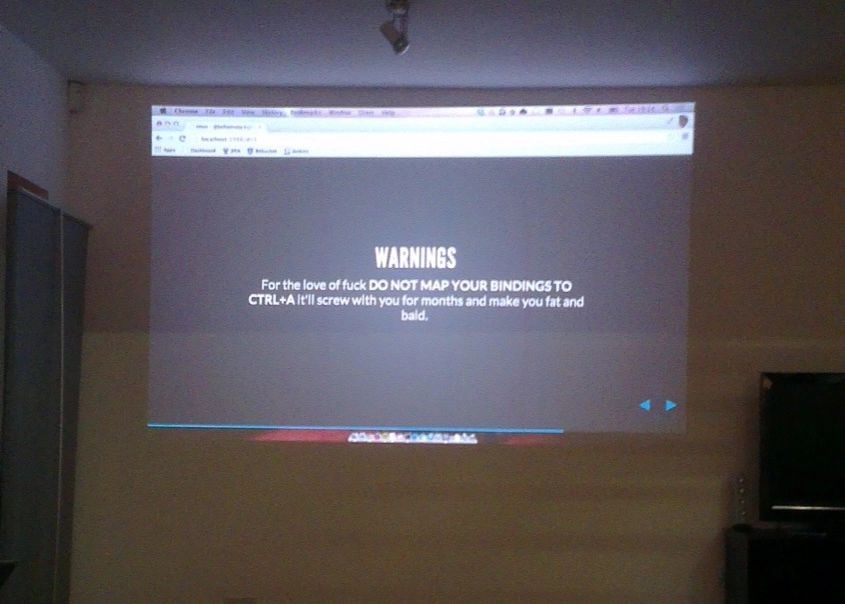Belfast Ruby: Talks on Elixir, Tmux and Jekyll
A quick write up on a few different talks given at Belfast Ruby
Tonight was another fine Belfast Ruby night and despite the weather a couple of folks made it out to hear three short talks on three very different topics.
Elixir
The first talk was given by Chris McGrath on the subject of Elixir, which was billed as having all the benefits of Erlang but with Ruby like syntax.
Elixir is something I have heard a fair bit about recently, it was covered in a recent Ruby Rogues episode and was one of the many things I had vaguely penciled in my ever growing list of things to check out.
Elixir is a language built on top of an Erlang VM but with nicer syntax, to steal a quote from Chris’ slides (which was a quote stolen from the Erlang homepage)
Elixir is a functional, meta-programming aware language built on top of the Erlang VM. It is a dynamic language with flexible syntax and macro support that leverages Erlang’s abilities to build concurrent, distributed and fault-tolerant applications with hot code upgrades.
One thing I had never got around to doing was actually taking a look at the language, I had heard it was much easier for an OO programmer to digest than some of the standard functional languages (like Erlang itself) but I hadn’t seen in it action. Luckily Chris came prepared with code examples to show how easy it can be to get up and running with it.
The talk certainly moved Elixir slightly up the list of things to play with.
Tmux
Next up was a talk by Stephen McCullough on the subject of using Tmux as your terminal, it is a terminal multiplexer, which means it lets you easily switch between multiple programs from the one terminal session, which is nice!
Again to steal from the homepage’s copy;
What is a terminal multiplexer? It lets you switch easily between several programs in one terminal, detach them (they keep running in the background) and reattach them to a different terminal. And do a lot more.
I had heard of Tmux but I have to confess I am a bit of a newbie when it comes to terminal programs, at home I just use the OSx default.
Having had a glimpse of some of the stuff Stephen showed us during a brief live demo, it is certainly something I want to maybe play about with as an improvement to my current setup, especially as I get back into using vim more (so much so that it is downloading right this second).
Stephen ended his talk with a warning, which I share here without comment;

Jekyll
Our final talk was by Coby Chapple on the static site generator Jekyll, which was the thing being talked about that I knew most about (in that I had installed the gem before and generated an HTML file from a Markdown file).
It would be rude not to steal some copy from the Jekyll homepage, seeing as I did for the other talks;
Transform your plain text into static websites and blogs.
A simple quote, but I think it sums up how simple but useful a tool it is.
Coby talked about some of the cool stuff you can do with it, how it links in easily with github pages and how you can perform some pretty complex logic without needing a server.
I had my eyes opened to just how powerful Jekyll is, I was always of the impression that for it to be useful you would need to have a layer on top like Octopress but it certainly has either a) always been as powerful and I didn’t realise, or b) has had some really cool improvements.
Personally, I don’t like writing in Markdown and I don’t write enough static sites to require a static site generator, but it is certainly something to be keeping half an eye on.
In Summary
Thanks so much to the three speakers for another excellent Belfast Ruby!
